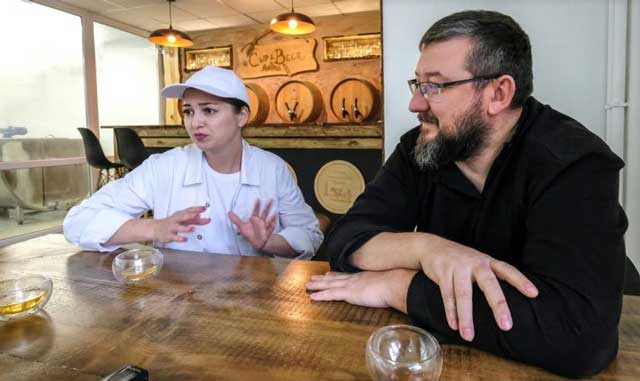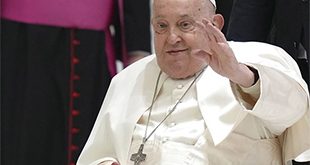
Korolyov, Russia | AFP | Elvira Kovtun made her first cheese in a pot in her kitchen four years ago.
Kovtun, a housewife and mostly self-taught cheesemaker, became so good that she and her husband decided to turn her passion into a business.
Last month, the high-school sweethearts and parents of three became the first Russians to win a gold prize at the World Cheese Awards, with their “Peshernyi” hard cheese taking the honour at the industry’s equivalent of the Oscars.
“I didn’t think this was possible,” Elvira’s husband, Vyacheslav Kovtun, told AFP at their small creamery in the industrial town of Korolyov, outside Moscow.
“Now I believe in everything.”
The family’s success shows how far Russia’s cheese-making industry has come since President Vladimir Putin banned Western food imports in 2014 in a tit-for-tat measure over the Ukraine crisis.
Many Russians had developed a taste for French and Italian cheeses prior to sanctions, and Moscow seized the opportunity to put in place an “import substitution” strategy.
This supported local entrepreneurs trying to set up businesses to replace imported goods.
The results were often mixed, however, with many customers complaining of the higher price and often inferior quality of the Russian-made products.
But dairy farming and cheese-making have become a bright spot.
According to Russia’s National Association of Milk Producers, production of cheese and cheese products grew by a third to 670,000 tonnes a year between 2013 and 2018.
Last week Putin confessed he was “somewhat worried” when the first punitive measures were introduced, but the events of the past few years proved that the sanctions had worked to “our economy’s advantage”.
– ‘Ground-breaking’ –
Hundreds of artisanal creameries have cropped up across the country and some, like the Kovtuns, are winning top marks from international critics.
Elvira and Vyacheslav, who are both 40 and opened their Korolyov creamery in 2018, had not expected success to come so quickly.
When Elvira called her husband to break the news of the award last month, she was sobbing, Vyacheslav said.
“I got scared. I thought something terrible had happened,” he said with a smile.
Their creamery’s website crashed from interest after the awards were announced and the winning cheese sold out until April.
More than 3,800 cheeses from 42 countries were in competition at this year’s World Cheese Awards in Bergamo, Italy, where products are awarded supergold, gold, silver or bronze prizes.
At last year’s competition no Russian entries were recognised but this year the Kovtuns’ “Cheese & Beer” creamery and three other Russian cheesemakers won a total of nine awards.
John Farrand, the managing director of the Guild of Fine Food which organises the competition, said the Kovtuns had put Russia on the international cheese map.
“Our gold winners are some of the best in the world and only a small percentage of entries do this well,” Farrand said, praising their Peshernyi cheese for “delivering a true sense of terroir”.
He said Russia’s lack of the cheese-making heritage of France or Italy could in some ways be an advantage.
“Free from the pressures of tradition, the country’s artisans can innovate and produce something ground-breaking and unique,” Farrand said in written comments to AFP.
Elvira said she spent several years perfecting Peshernyi and the recipe is a closely guarded secret.
– ‘Cheese fever’ –
With its nutty and fruity hints, Peshernyi matures for seven months in a cellar and sells for 1,800 rubles ($28, 25 euros) a kilo.
“I can’t last a day without cheese,” Elvira said, placing curd grains in moulds with the help of an assistant.
“These are all my babies. I love them.”
The Kovtuns now make 20 soft and hard varieties including camembert and truffle brie, employing a handful of staff.
They produce cheeses five days a week but demand far outstrips supply.
Yevgeny Barabanshchikov, a chef and connoisseur of European cheeses who traditionally shunned Russian-made dairy products, went to meet the Kovtuns as soon as he learned of their success in Bergamo.
“My interest is professional,” said Barabanshchikov, executive chef at Integrita, a top supplier of high-quality imported food.
“I was very pleased for them because I know the cheese-making technology,” he told AFP, stressing that hard cheeses require a lot of investment, expertise and good-quality milk.
One of the people who has most championed the Kovtuns is their competitor Oleg Sirota, arguably Russia’s best-known cheesemaker.
“The more good creameries we have, the more people will trust us,” said the 31-year-old head of the Union of Russian Cheesemakers.
He himself took his first gold at a regional competition in France in October.
Sirota recalled how Vyacheslav, who owned a construction firm at the time, ambushed him at a gas station outside Moscow in 2016, saying he wanted to learn the business of cheese-making and was ready to sell his company.
“I was stunned,” Sirota said.
They now help each other, plan to expand their operations and praise Putin for creating what Sirota calls Russia’s “cheese fever”.
Vyacheslav said Russia’s modern cheesemakers are continuing a long tradition.
“We are not inventing anything new,” he said. “We made a lot of cheese a hundred years ago and exported it to Europe and the Baltics. We are now reviving our forefathers’ recipes.”
 The Independent Uganda: You get the Truth we Pay the Price
The Independent Uganda: You get the Truth we Pay the Price


